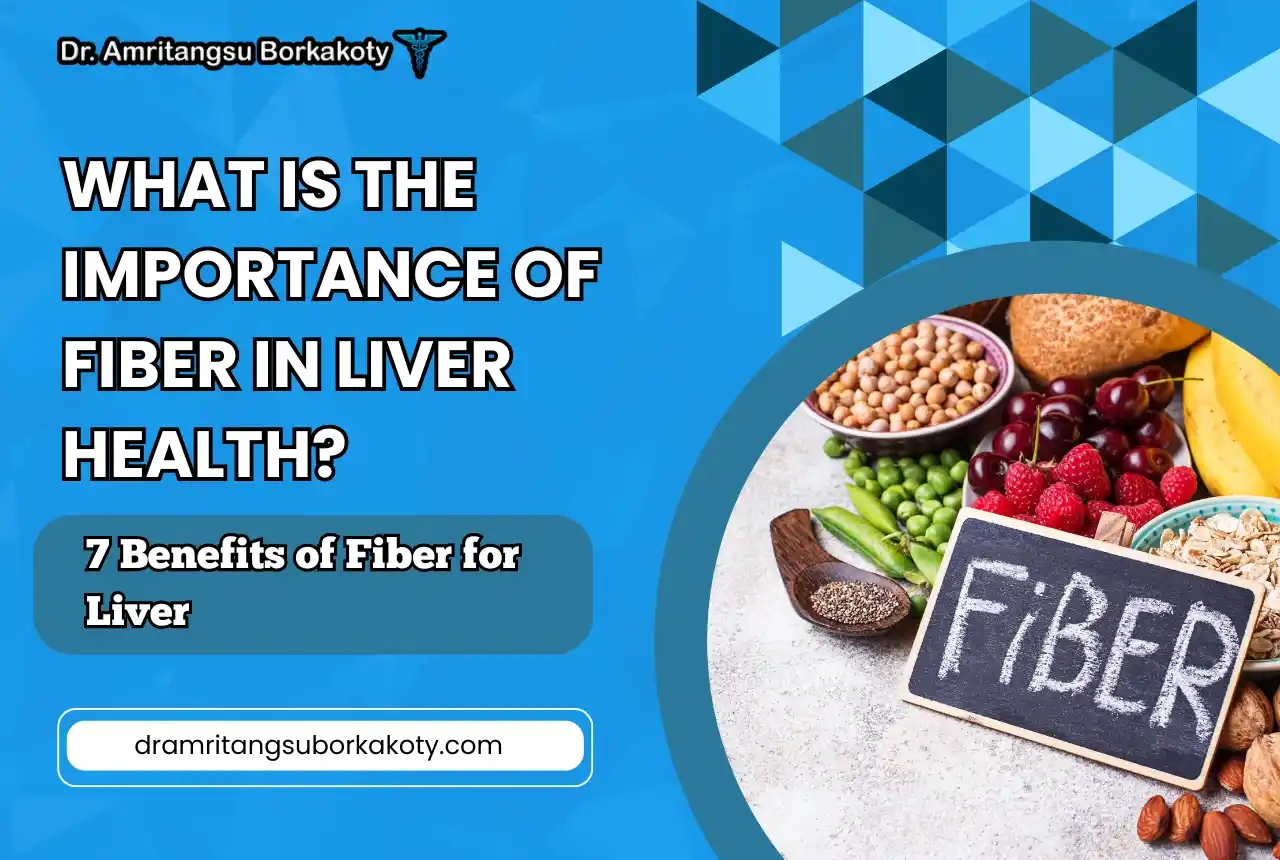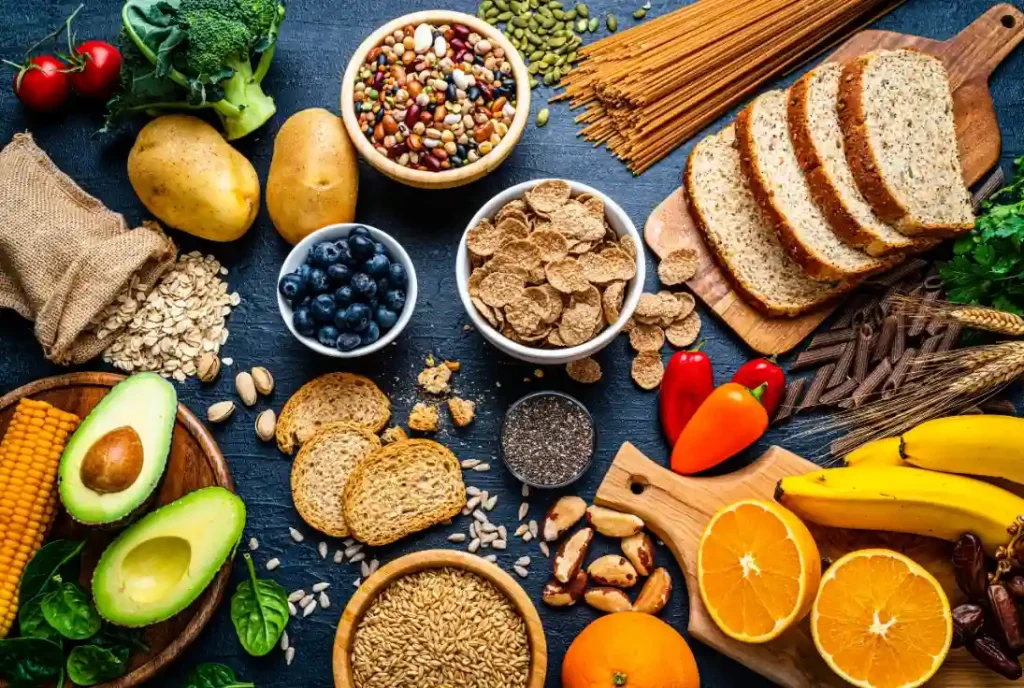
-
 Posted By Dr. Amritangsu Borkakoty
Posted By Dr. Amritangsu Borkakoty -
-
Comments 0
Did you know the liver performs more than 200 functions in your body? Being the powerhouse of your body, it performs functions such as detoxification of harmful substances, metabolism of nutrients, bile production to digest food, and maintaining the blood sugar level. The importance of fiber in liver health cannot be overstated, as fiber plays a key role in supporting the liver’s ability to function efficiently and stay resilient against chronic conditions.
Healthy liver maintenance is increasingly recognized as very important in preventing most diseases, which may afflict the organ, including fatty liver disease and cirrhosis.
Dietary fiber has emerged as an essential player in the assistance in preserving the health of the liver. Fiber has been studied and shown to reduce liver fat, enhance metabolic health, as well as cut down the risk of chronic liver diseases.
According to various studies, fiber is indeed a lifesaver for liver health. The importance of fiber in liver health inhibits the buildup of fats in the liver, promotes metabolic processes, and minimizes the risk of chronic liver conditions. In detoxification, fiber ensures good digestion thus letting your liver focus well on its work.
Importance of Fiber in Liver Health?
There are two types of dietary fiber.
Soluble Fiber: Dissolves in water, forming a gel-like consistency in the gut. This type of fiber, found in oats, lentils, beans, fruits, and certain vegetables, helps regulate blood cholesterol and glucose levels—factors directly tied to liver well-being.
Insoluble: Provides bulking to stool, thus aiding in more efficient digestion and regular bowel movements. Found in whole grains, nuts, seeds, and the skins of fruits and vegetables.
How Much Fiber Should You Have Each Day?
Most experts recommend a daily intake of 25 grams for women and 38 grams for men. Unfortunately, most people don’t get enough and often miss out on potentially fiber-rich whole foods. In effort to understand the importance of fiber in liver health is that it could help motivate better diet choices since consuming fiber significantly aids in decreasing liver fat, aids digestion, and supports the detoxification process.
Best High-Fiber Foods for Liver Function
Add these to your diet and your liver function will improve appreciably:
- Whole Grains: Brown rice, quinoa
- Legumes: Lentils, black beans
- Fruits: Apples, pears
- Vegetables: Broccoli, carrots
- Nuts & Seeds: Almonds, chia seeds
Expert Opinion
Dr. Amritangsu Borkakoty remarks, “Fiber not only helps the digestive system but it reduces the inflammatory markers and promotes the detoxification processes of the liver.”
A diet high in fiber promotes your liver supporting the remainder of your body. Small changes can make a big difference on your plate and help your health!
The 7 Remarkable Benefits of Fiber for Your Liver
1. Reduces Risk of Fatty Liver Disease
Fiber prevents the accumulation of fat in the liver, which is crucial in managing nonalcoholic fatty liver disease (NAFLD). A diet rich in fiber can significantly reduce the risk of developing this condition by optimizing lipid metabolism.
2. Enhances Detoxification Process
Fiber promotes the expulsion of toxins from one’s body by making bowel movements regular. This detoxification is very essential for keeping the liver healthy and preventing toxic buildup.
3. Regulates Blood Sugar Levels
Through improving glucose metabolism, dietary fiber aids in regulating blood sugar levels. This regulation minimizes strain on the liver, especially important for people diagnosed with insulin resistance or diabetes.
4. Supports Weight Management
A high-fiber diet can aid with weight maintenance by making one feel fuller and use fewer calories on average. Obviously, maintaining a healthy weight helps prevent many obesity-related liver diseases.
5. Promotes Beneficial Gut Bacteria
The fiber feeds good gut microbes producing SCFAs. These SCFAs have been associated with anti-inflammatory effects and improved gut-liver axis.
6. Reduces Liver Cancer Risk
Other studies suggest that increased dietary fiber consumption is inversely linked with the risk of developing liver cancer. Several researchers claim that this protective effect may be due to fiber decreasing inflammation and also improving metabolic health.
7. Decreases Chronic Liver Disease Mortality
Increased intake of dietary fiber was found to link up with decreased death rates for chronic liver diseases. This particular link shows how the long-term maintenance of liver health often relies on fiber.
Best Fiber Sources for Optimal Liver Health

Boost Your Liver Health with Fiber-Rich Foods
Your liver is the powerhouse of your body, and it is vital to put the correct fuel inside it for a real difference. There are many simple ways, like eating fiber-packed foods, to make your liver thrive. Here are some delicious options that your liver will love.
- Whole Grains: Think brown rice, oats, quinoa, or whole-wheat bread. These wholesome goodies improve digestion and reduce inflammation, helping your liver stay in top shape.
- Cruciferous Veggies: Broccoli, kale, cauliflower, and Brussels sprouts aren’t just nutritious; they’re like a mini spa for your liver. Packed with fiber and antioxidants, they help detoxify your body and protect against liver issues.
- Legumes and Beans: Hearty lentils, creamy chickpeas, and black beans are fiber goldmines. They balance blood sugar and boost gut health, giving your liver a hand in keeping that action of keeping your blood sugar balanced under control.
- Fruits and Berries: Apples, pears, berries, and citrus fruits are sweet yet packed with goodness. Soluble fiber and essential antioxidants in them make them a great snack fresh, but don’t go overboard. Too much sugar doesn’t exactly have your liver singing.
- Nuts and Seeds: Snack on almonds, sprinkle chia or flaxseeds on meals or serve yourself a handful of walnuts. These crunchy heroes are rich in fiber and healthy fats that help calm inflammation and give support to your liver’s daily grind.
Eating for your liver doesn’t have to be rocket science. A mix of these fiber-rich foods in your diet will keep your liver happy and healthy.
Practical Tips for Increasing Fiber Intake
Add more fiber to your food without making it complicated and overwhelming. It’s actually pretty easy, and you can step up your intake easily and enjoy the benefits without upsetting your stomach:
- Start Slow: Do not go all out in a fiber overhaul. Instead, do it gradually by adding 2–3 grams per day on top of your usual intake. This allows the body time to adjust and avoids irritating the digestive system.
- Planning Your Meal Smart: Make fiber a regular guest at every meal. Toss berries into your breakfast oatmeal, pair your lunch with a side of veggie-packed salad, and opt for whole grains like brown rice or quinoa with dinner.
- Stay Hydrated: As you up your fiber game, don’t skimp on water! Drinking enough fluids keeps things moving smoothly, preventing bloating or constipation.
- Listen to Your Body: Everybody is different. If bloating or gas is an issue for you, dial back a notch or switch things up. Try a combination of soluble (oats) and insoluble (leafy greens) fibers to find what works best for you.
Using these suggestions, you’ll enhance digestion and promote liver health. If you understand the role of fiber with respect to the liver, you can stay on top of a well-functioning liver while keeping your gut clean and your body energized.
Recent Posts
- Common Causes of Stomach Ulcers and Effective Treatment Options
- Early Symptoms of Liver Damage: How to Spot the First Warning Signs Before It’s Too Late
- Best Treatment for Hepatitis B and C: Your Complete Guide to Symptoms, Care, and Prevention
- How to Reduce Liver Inflammation Fast: 5 Proven Tips for Rapid Liver Recovery
- Why You Shouldn’t Ignore NAFLD: 5 Shocking Health Risks You Need to Know



